Retail analytics is inherently complex, driven by the challenge of managing massive amounts of data from diverse online and offline channels, customer touchpoints, and constantly evolving behaviors. Navigating this fragmented data landscape makes it difficult for businesses to gain a unified view of performance and accurately attribute conversions and revenue to channels.
Advanced retail analytics software addresses this complexity by unifying data, enabling real-time insights, and providing tools to optimize marketing performance and customer experiences.
In this guide, we’ll explore 15 of the best retail analytics tools that help businesses streamline their analytics, uncover actionable insights, and drive measurable results.
1. Google Analytics
Best for: Delivering valuable insights across the entire customer lifecycle for both online and offline operations.
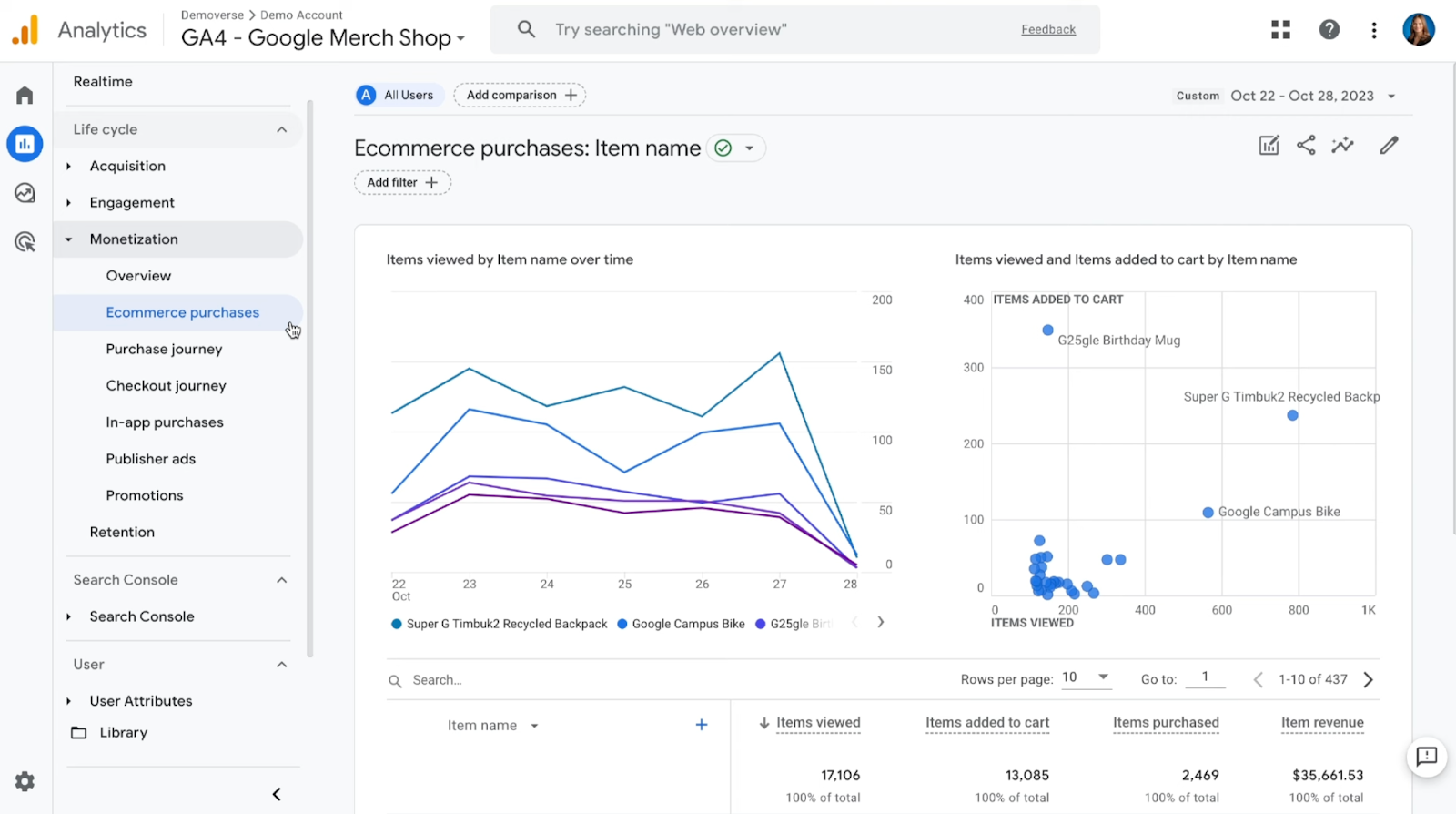
Google Analytics 4 (GA4) is a website and app analytics tool, providing a unified view of customer interactions across online and offline channels. With advanced tracking and machine learning capabilities, GA4 enables retailers to analyze customer journeys, optimize marketing strategies, and improve overall performance.
Key features:
- Cross-Channel Attribution: GA4 enables retailers to track customer interactions across websites, apps, and offline channels like in-store purchases. This feature helps analyze the entire customer journey.
- Integration with Offline Data: By integrating offline conversions, such as point-of-sale (POS) transactions, GA4 enables retail businesses to bridge the gap between online and offline performance, creating a unified analytics framework.
- Enhanced Ecommerce Tracking: Features, such as product performance analysis, cart abandonment rates, and checkout behavior tracking, allow retailers to identify bottlenecks in the online sales funnel and refine their approach to increase conversions.
- Event-Based Data Model: GA4’s flexible event-based tracking allows retail brands to measure custom actions like product searches, wishlist additions, and loyalty program engagements, providing granular insights into shopping behavior.
- Audience Builder for Retail Campaigns: GA4 makes it easy to create and segment audiences based on purchase behavior, product interests, or geographic location. These audiences can be exported directly to Google Ads for precise targeting.
- Custom Insights and Alerts: Retailers can configure automated insights to monitor anomalies, such as sudden drops in product views or spikes in cart abandonment, allowing for immediate corrective action.
2. Improvado
Best for: Retail marketing analytics, mainly simplifying data management, improving performance visibility, and maximizing the efficiency of their marketing efforts.
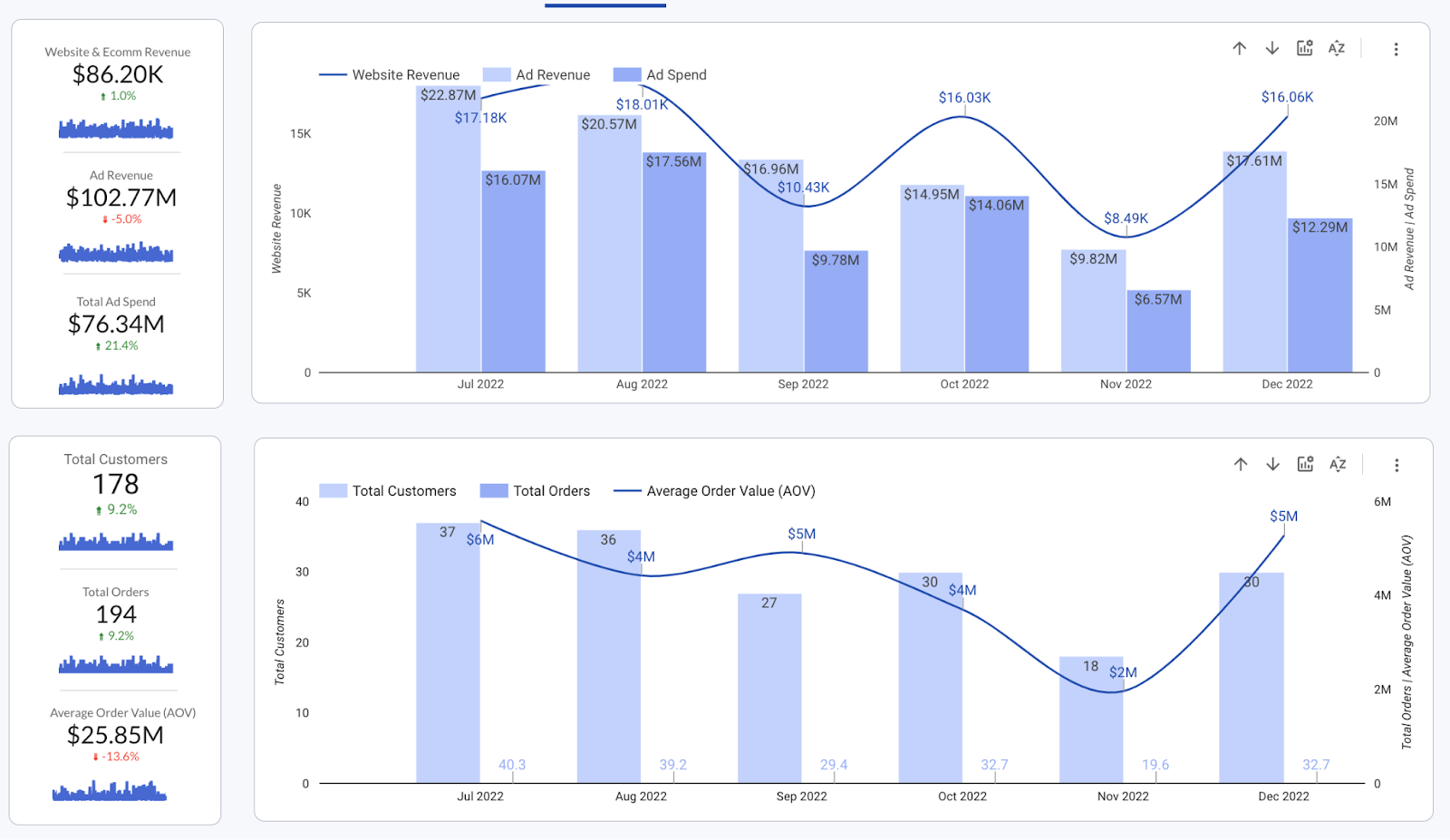
Improvado is a powerful retail marketing analytics platform. By automating data collection, harmonization, management, and insight discovery, Improvado empowers retailers to optimize marketing performance, track ROI, and make data-driven decisions with ease.
Key features:
- Comprehensive Data Integration: Improvado seamlessly integrates with over 500 platforms, including major ecommerce and retail tools like Amazon Analytics, Walmart Connect, Shopify, eBay, Awin, and custom online and offline solutions.
- Data Transformation: Harmonizes and combines data from multiple sources into a standardized format for complete view. For example, retail brands benefit from unifying data from Google Ads, email campaigns, and in-store QR code scans.
- Scalability for Enterprise Needs: Handles large volumes of data across multiple locations and channels, making it ideal for complex retail operations.
- Customizable Dashboards: Improvado provides pre-built dashboard templates or builds tailored dashboards to monitor key metrics in a setup that works specifically for your retail business.
- Real-Time Performance Tracking: Improvado provides a robust solution for campaign performance, brand safety, and data compliance tracking. It monitors adherence to pre-defined rules, paces metrics, and issues alerts for any anomalies, problems, or metrics drips. This solution enables ecommerce brands to adjust strategies quickly in response to market trends.
- Cross-Channel Attribution: Improvado establishes a unified tracking infrastructure that captures every customer interaction across all campaigns and channels, including granular conversion and event tracking. Using common single-touch and multi-touch attribution models and custom ones, Improvado analyzes the impact of various touchpoints, helping businesses allocate ad spend effectively and maximize ROI.
3. Heap
Best for: Digital platform optimization and gaining a holistic understanding of customer behavior.
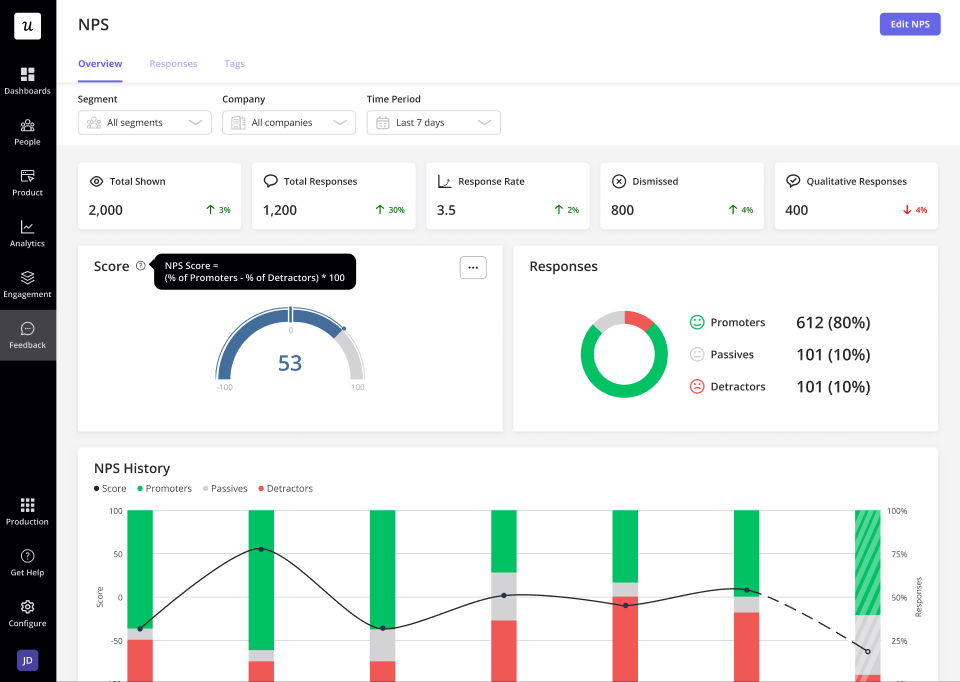
Heap is a comprehensive retail analytics solution that provides deep insights into customer behavior across digital touchpoints. By automatically capturing all user interactions, Heap enables retailers to optimize the customer journey, enhance engagement, and drive conversions.
Key features:
- Autocapture: Heap's autocapture functionality records every user action—such as clicks, page views, and form submissions—without requiring manual event tagging. This ensures a complete dataset, allowing retail stores to analyze customer interactions comprehensively and identify areas for improvement.
- Visual Labeling: This feature allows retailers to label and organize events directly within the user interface, facilitating easy tracking of specific actions like product views or add-to-cart events. It simplifies the process of monitoring key performance indicators relevant to store operations.
- Session Replay: Provides a visual playback of individual user sessions to observe how customers navigate a shopping website.
- Effort Analysis: This tool quantifies user friction by analyzing the steps customers take to complete tasks. Retailers can pinpoint processes that require excessive effort, such as complicated checkout procedures, and streamline them to improve the overall shopping experience.
- Segmentation and Cohort Analysis: Segment users based on behaviors, customer demographics, or purchase history. This allows for targeted marketing campaigns and personalized experiences, which can lead to higher engagement and conversion rates.
- Retention Analysis: By tracking repeat purchases and customer loyalty trends, Heap helps retailers understand retention metrics and develop strategies to increase customer lifetime value.
4. Shopify POS
Best for: Retail businesses present on Shopify, seeking to bridge the gap between physical and digital channels.
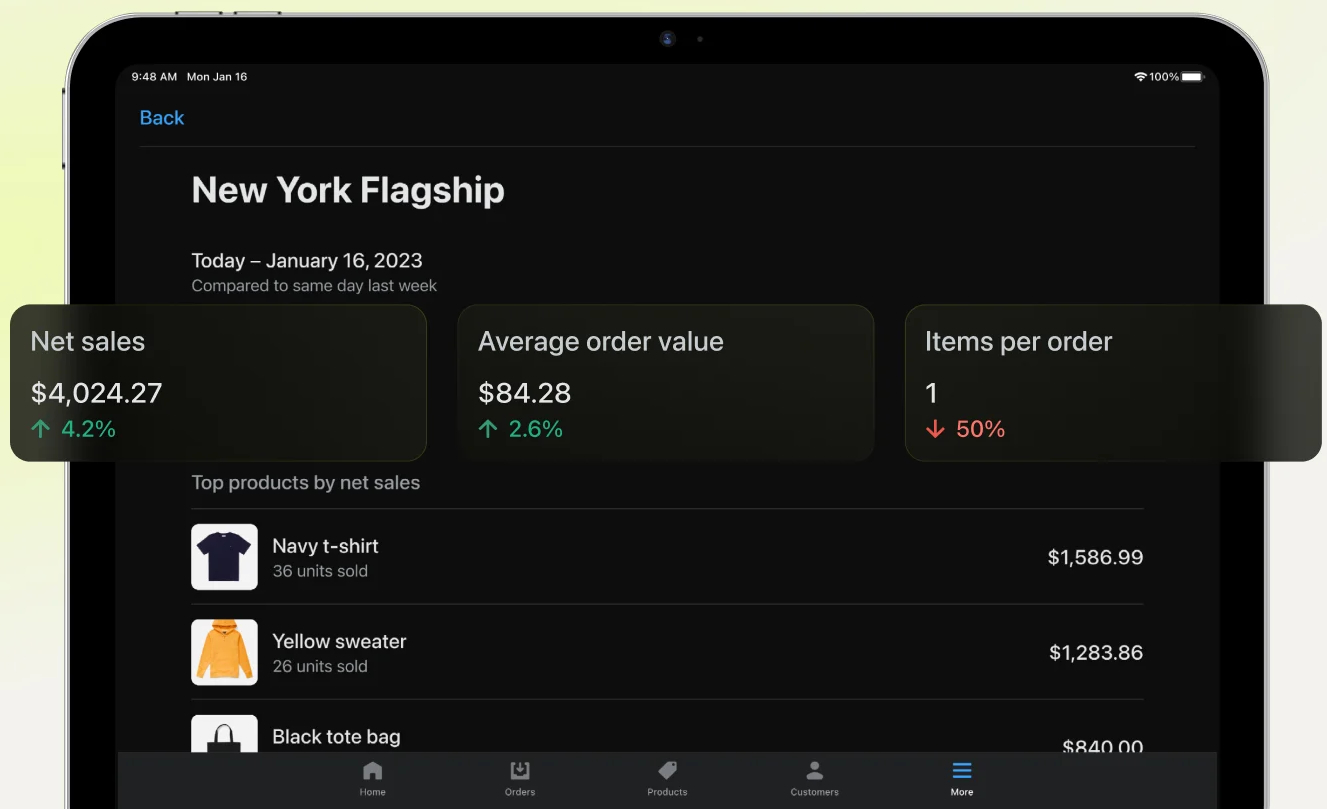
Shopify POS (Point of Sale) is a comprehensive retail store analytics tool that seamlessly integrates in-store and online sales data.
Key features:
- Unified Sales Reporting: By consolidating data from both physical and online stores, Shopify POS offers a holistic view of sales performance. Retailers can analyze trends across channels, identify top-selling products, and make informed decisions on inventory strategies.
- Customer Profiles and Purchase History: The system automatically creates detailed customer profiles, capturing contact information, purchase history, and preferences. This enables personalized marketing campaigns and loyalty programs.
- Inventory Management: Shopify POS provides real-time inventory tracking across all locations, reducing the risk of stockouts or overstocking. Retailers can set up automatic restock alerts and manage transfers between locations, ensuring optimal stock levels and meeting customer demand efficiently.
- Omnichannel Capabilities: With features like "Buy Online, Pick Up In-Store" (BOPIS) and "Buy In-Store, Ship to Customer," Shopify POS bridges the gap between online and offline shopping experiences. Retailers can analyze the effectiveness of these services and adjust strategies to meet customer preferences.
Advanced Reporting and Analytics: The system offers customizable reports on sales, inventory, and customer behavior. Retailers can set specific parameters to monitor key performance indicators (KPIs) and gain insights into areas such as sales by product, staff, store location, time period, and vendor.
5. Crisp Data Platform
Best for: Category management, sales and supply chain analytics.
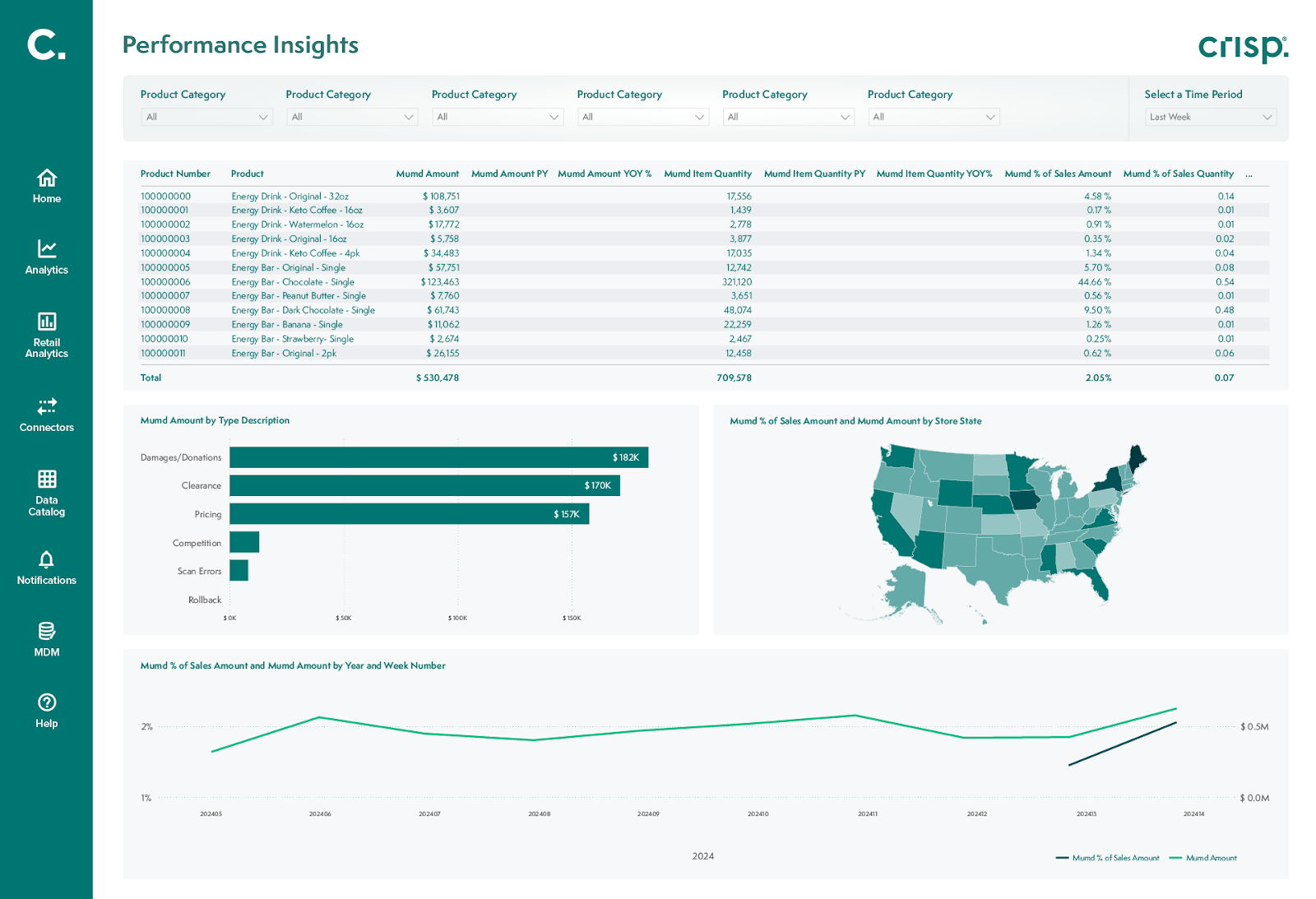
Crisp Data Platform is a retail analytics platform automating data flow from retailers and distributors into preferred tools. It offers pre-built dashboards for sales, supply chain, and category management, enabling retailers to access harmonized data across partners, align teams, and forecast with confidence.
Key features:
- Automated Data Integration Workflows: Crisp automates the flow of customer data from various retailers and distributors, eliminating the need for manual data consolidation and reducing the risk of errors.
- Pre-Built Dashboards: The platform includes dashboards tailored for sales, supply chain, and category management, providing actionable insights to grow your business.
- Custom Product Attribution: Allows for custom product attribution, helping retailers analyze performance at a granular level and make informed decisions.
- Historical Backfill and Automated Refreshes: The platform supports historical data backfill and ensures data is refreshed automatically, keeping your analytics up-to-date.
- Drill-Down Capabilities: Users can easily drill down into reports to explore store- and item-level details, facilitating a deeper understanding of trends and performance metrics.
6. Hubspot
Best for: A comprehensive understanding of retail business operations.
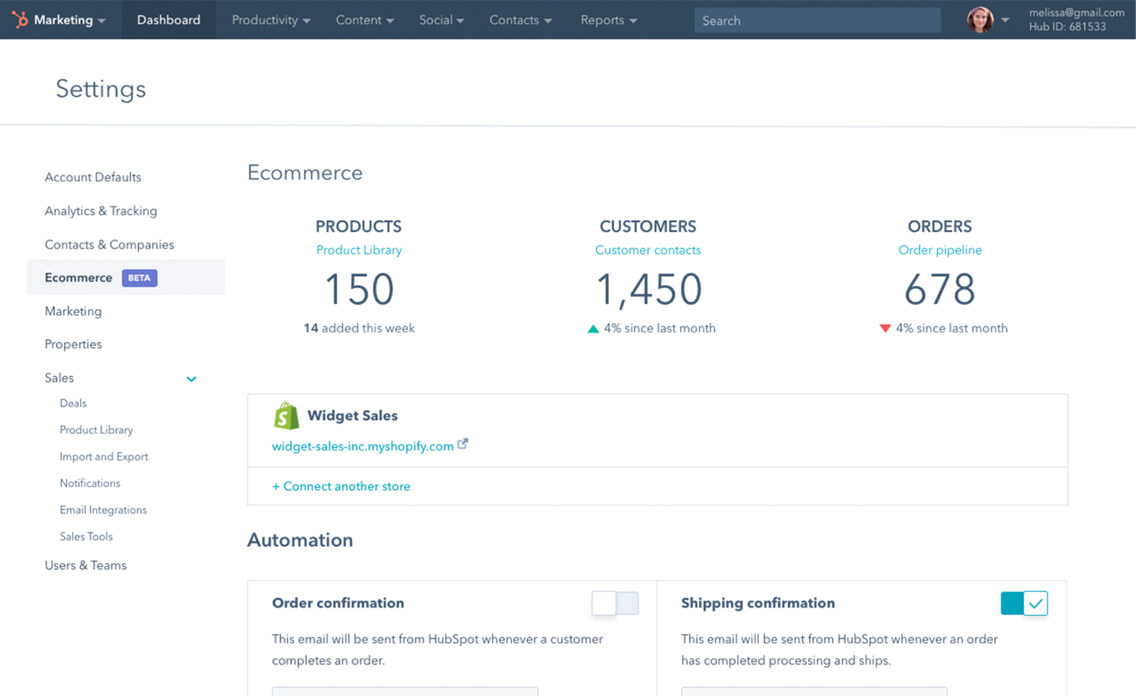
HubSpot is a comprehensive CRM platform that also offers robust retail analytics capabilities. By integrating marketing, sales, and service data, HubSpot provides retailers with a unified view of customer interactions, enabling data-driven decisions to enhance ecommerce performance.
Key features:
- Sales Analytics: HubSpot's sales analytics tool offers out-of-the-box reports and customizable dashboards, allowing retailers to track KPIs such as deal pipelines, sales activities, and revenue forecasts.
- Marketing Attribution Reporting: This feature helps retailers analyze the effectiveness of various marketing channels and campaigns by attributing conversions and revenue to specific touchpoints.
- Customer Segmentation: HubSpot allows retailers to segment customers based on behaviors, purchase history, and demographics to support targeted marketing campaigns and personalization.
- Ecommerce Integration: Seamless integration with ecommerce platforms enables real-time synchronization of customer and order data. This ensures accurate tracking of sales performance and inventory levels, supporting informed decision-making.
- Customizable Dashboards: Stores can create tailored dashboards to monitor specific retail metrics and KPIs, such as sales by product, region, or time period.
7. Mixpanel
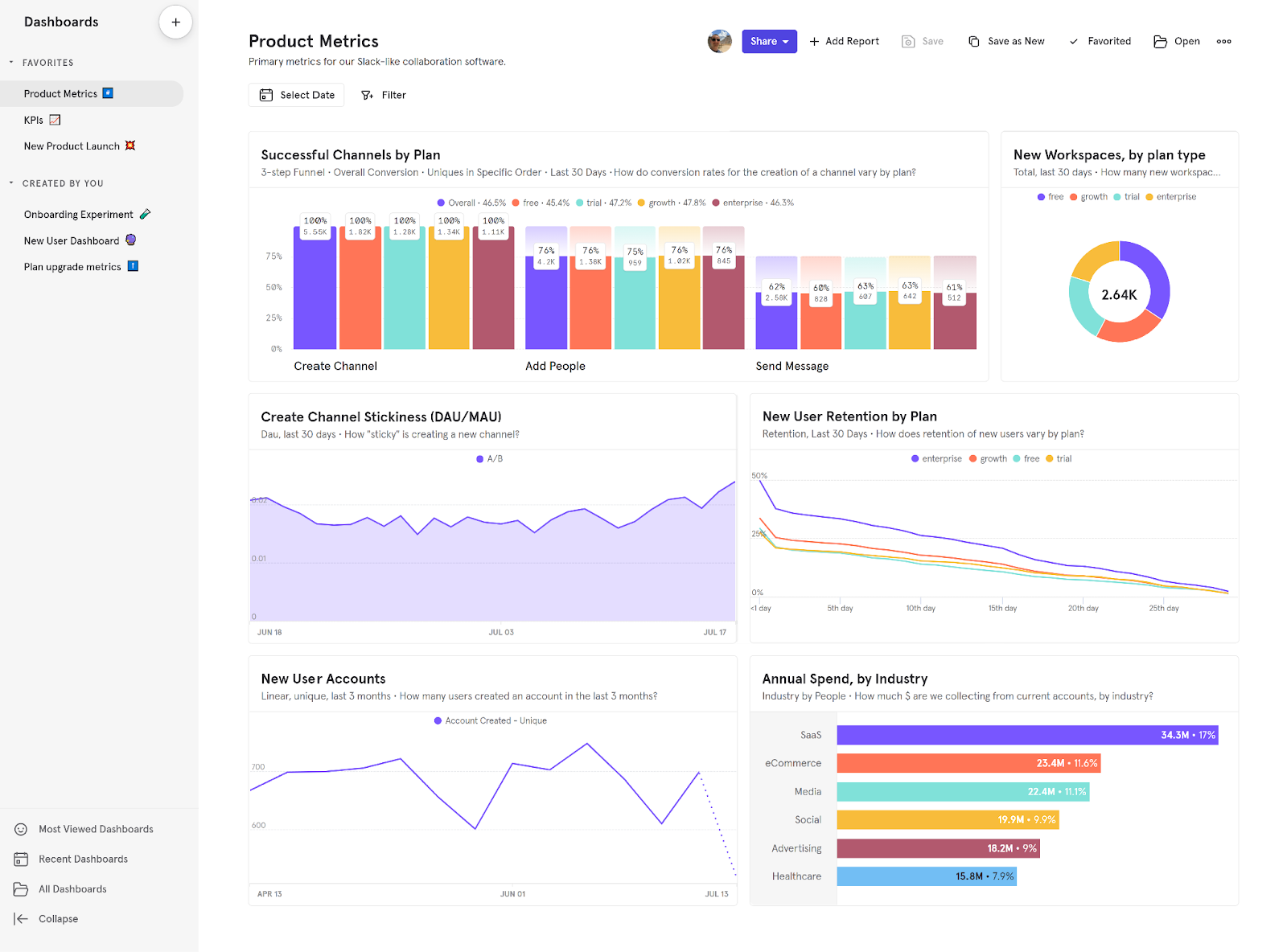
Mixpanel is a powerful product analytics platform that provides deep insights into customer behavior across digital touchpoints. By tracking user interactions in real-time, Mixpanel helps retailers optimize the customer journey, enhance engagement, and drive conversions.
Key features:
- Behavioral Analytics: Mixpanel captures detailed data on customer actions, such as product views, cart additions, and purchases, allowing retailers to understand how customers interact with their online store and identify areas for improvement.
- Funnel Analysis: This feature enables retailers to visualize the steps customers take from landing on the site to completing a purchase, helping to identify drop-off points and optimize the sales funnel to increase conversion rates.
- Cohort Analysis: By grouping users based on shared characteristics or behaviors, retailers can analyze retention patterns and the effectiveness of marketing campaigns over time, leading to more targeted and effective strategies.
- A/B Testing: Mixpanel allows retailers to test different versions of web pages or features to determine which performs better, facilitating data-driven decisions to enhance user experience and boost sales.
8. Semrush
Best for: Optimizing digital strategies and achieving sustainable growth in a competitive digital landscape.
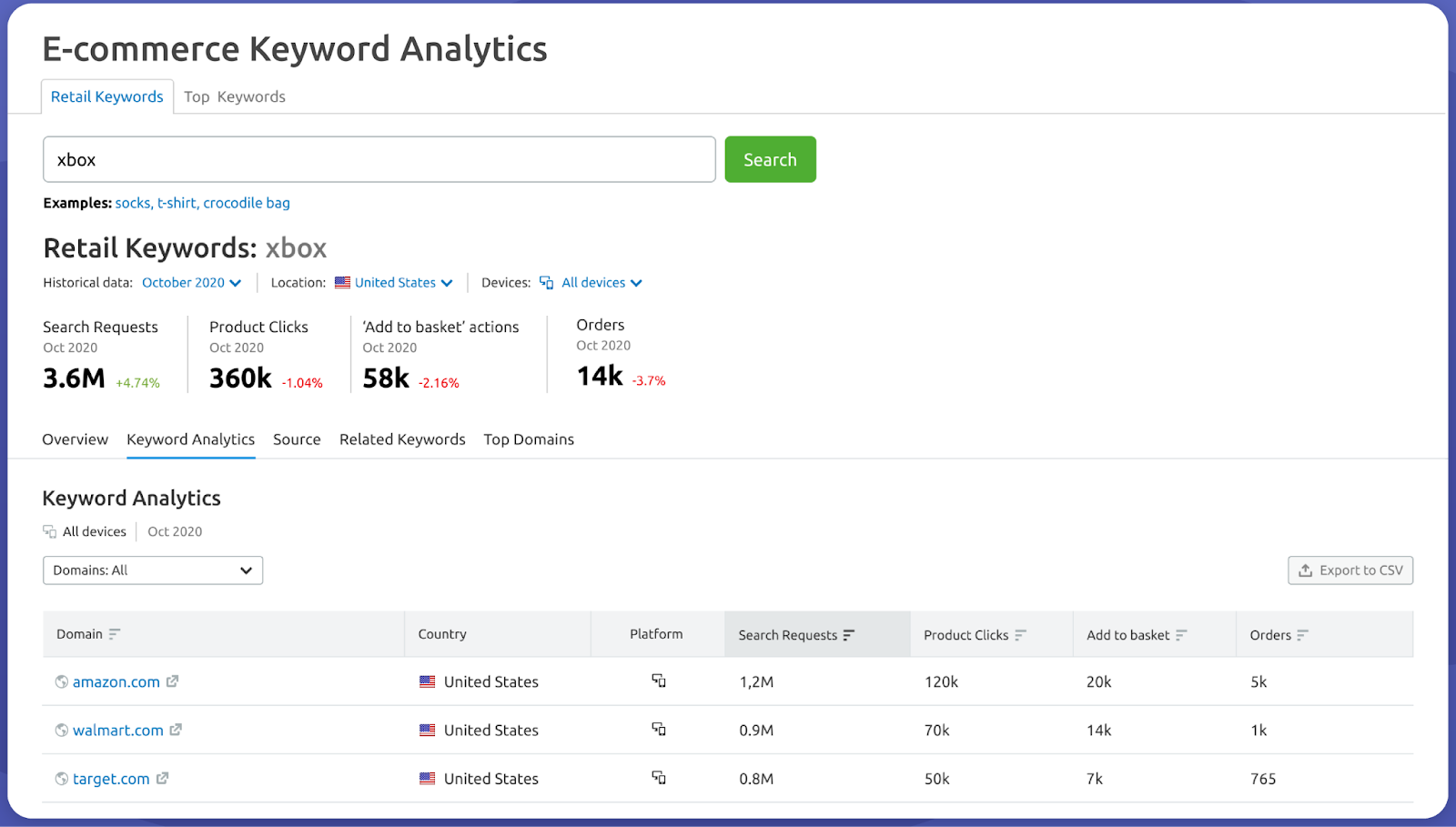
Semrush is a versatile digital marketing tool that provides retailers with powerful insights into online visibility, competition, and audience behavior.
Key features for retail marketing analytics:
- Competitor Analysis: Provides detailed insights into competitors' online strategies, including traffic sources, keyword rankings, and paid ad campaigns. Retailers can identify market gaps and refine their approach to stay ahead.
- Keyword Research and SEO Optimization: Semrush helps retail brands discover high-performing keywords and optimize product pages and content for better search engine rankings, driving organic traffic and increasing visibility.
- Traffic Analytics: Offers a comprehensive overview of website traffic, user behavior, and engagement metrics, enabling retailers to identify high-performing channels and focus marketing efforts effectively.
- Market Explorer: Analyzes market trends and audience demographics, helping brands understand their target audience and refine retail marketing strategies.
- Content Marketing Insights: Evaluates the performance of content strategies and suggests improvements to boost engagement, traffic, and conversions for ecommerce brands.
- Advertising Research: Semrush tracks and analyzes paid ad performance across platforms, providing data to refine ad spend and maximize return on investment (ROI).
9.Tableau
Best for: Data visualization and business intelligence in the retail industry.
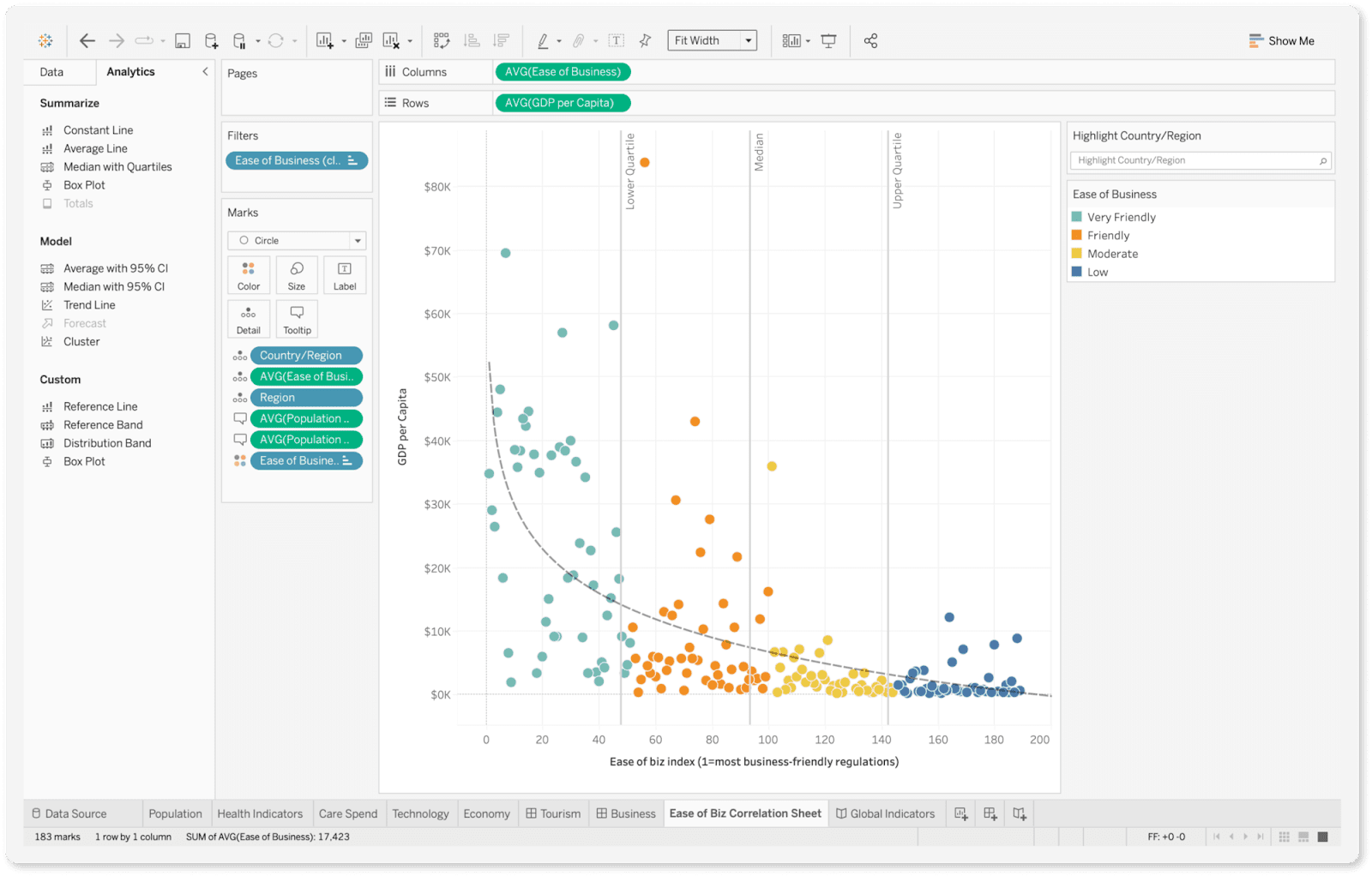
Tableau is a leading platform for business intelligence and data analytics in retail industry that enables retailers to uncover actionable insights, optimize operations, and enhance the customer experience.
Key features:
- Advanced Data Visualization: Allows retailers to create interactive dashboards that visualize sales trends, customer behavior, and inventory metrics, offering a clear and actionable view of business performance.
- Omnichannel Analytics: Aggregates data from both online and offline sources, helping retailers track performance across all customer touchpoints and optimize the omnichannel experience.
- Inventory and Supply Chain Analysis: Provides insights into stock levels, demand patterns, and supply chain efficiency, enabling better inventory management and reducing operational inefficiencies.
- Customer Segmentation: Enables detailed analysis of customer demographics, purchasing habits, and preferences, supporting personalized marketing campaigns and improving customer retention.
- Sales and Revenue Insights: Tracks revenue by region, product category, and time frame, helping retailers identify top-performing products and refine pricing or promotional strategies.
- Integration with Retail Tools: Seamlessly connects with retail data platforms, CRMs, and ecommerce tools, ensuring comprehensive and real-time analytics.
10. Supermetrics
Best for: Small retail brands looking for a tool to integrate marketing and sales data into a unified storage.
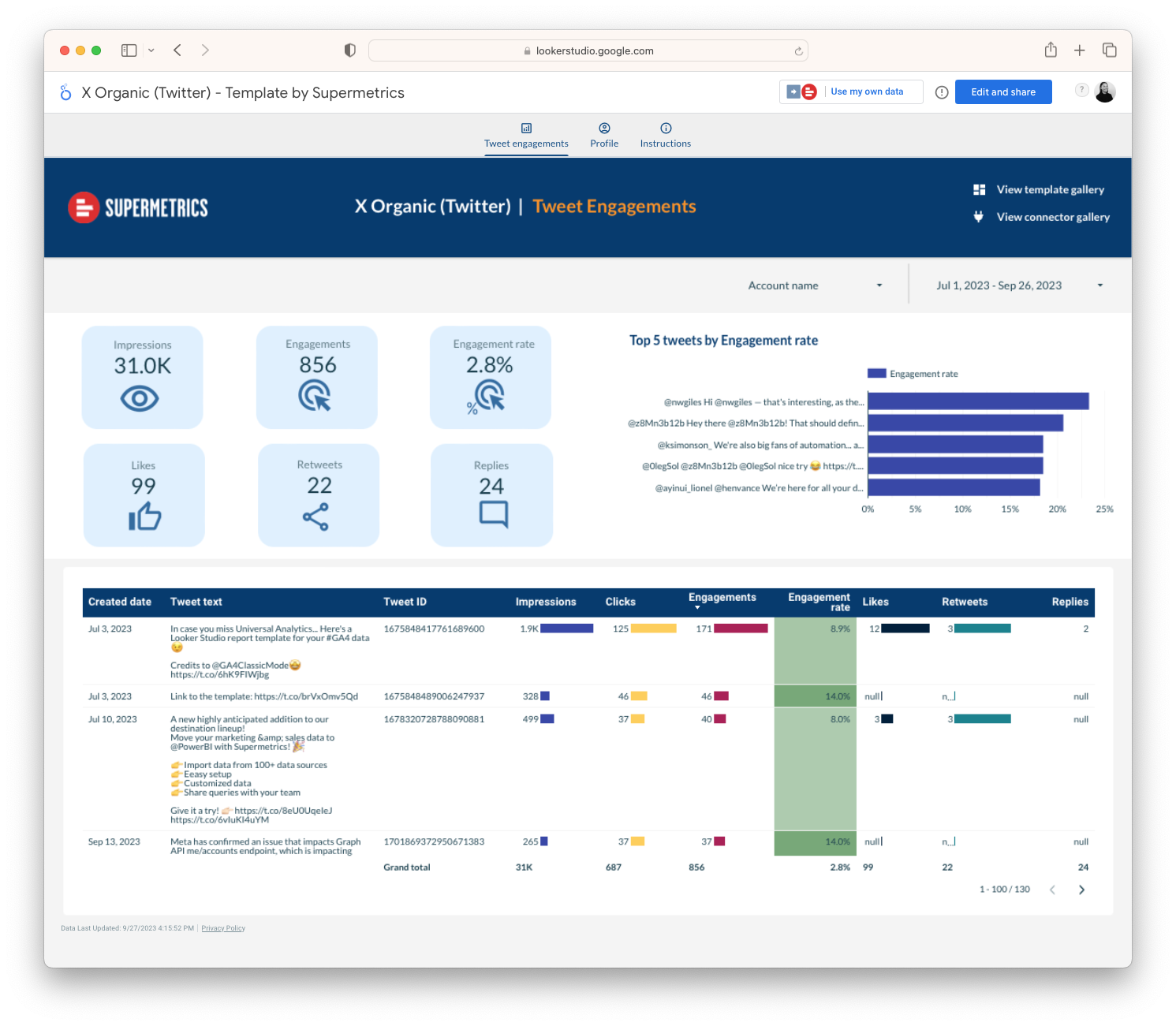
Supermetrics is a data integration tool that simplifies the process of aggregating marketing and sales data for retail businesses.
Key features:
- Data Integration: Supermetrics connects with multiple marketing platforms, retail tools, and CRMs, automating the transfer of key metrics.
- Pre-Built Connectors: Supports a wide range of connectors for popular retail platforms like Shopify, Google Ads, and Facebook Ads, allowing quick and easy data setup without extensive coding.
- Centralized Reporting: Consolidates retail analytics into a single location, such as Google Sheets, Data Studio, or Excel, providing a unified view of retail data.
- Customizable Data Visualizations: Works seamlessly with BI tools like Tableau and Power BI, providing flexibility in how retail data is visualized and analyzed.
11. Adobe Analytics
Best for: Deriving deep insights to enhance customer satisfaction and maximize retail profitability.
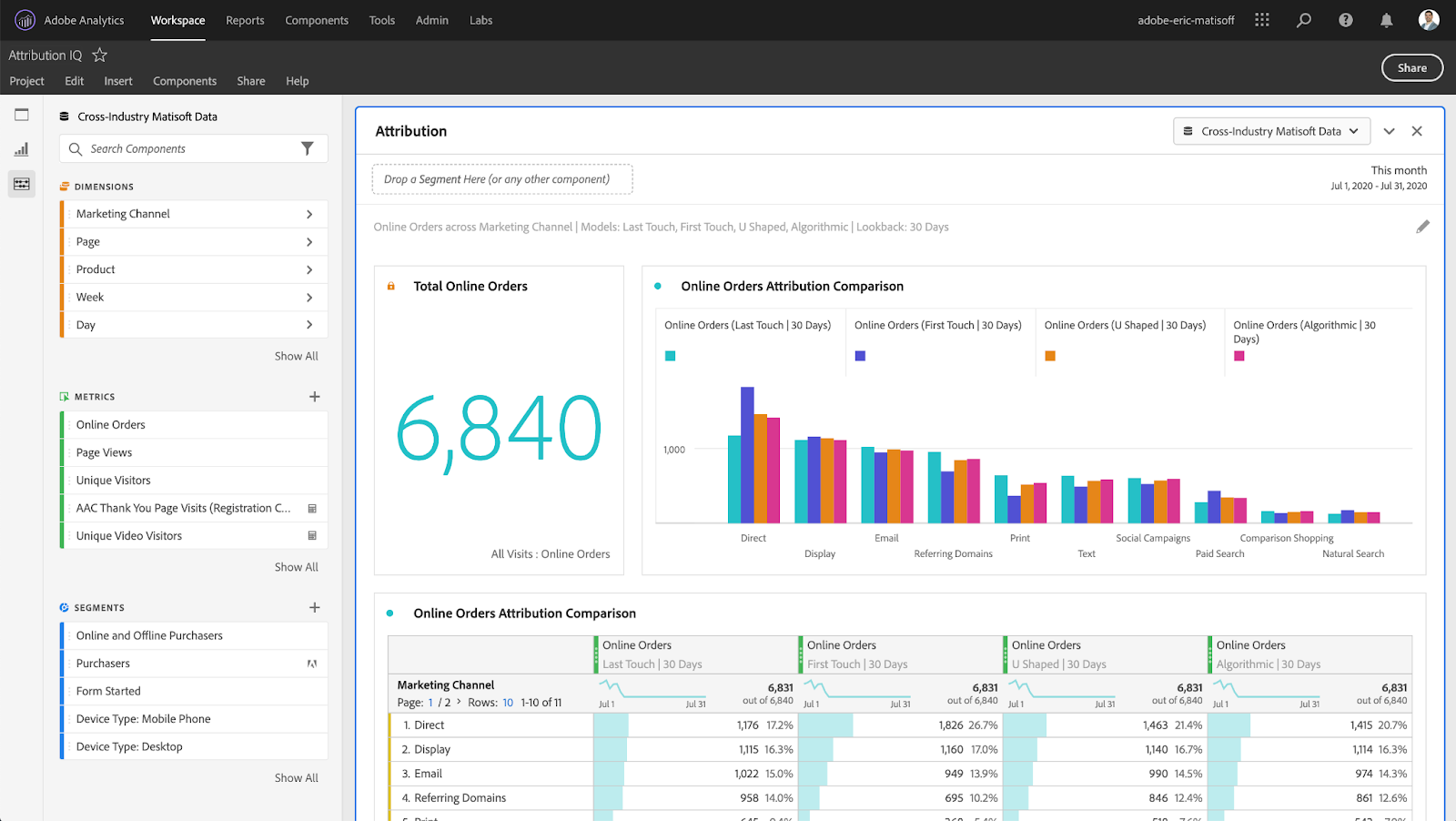
Adobe Analytics is a comprehensive retail data analytics platform designed to provide deep insights into customer behavior and interactions across multiple retail channels.
Key features:
- Cross-Channel Attribution: Tracks customer interactions across online and offline touchpoints, enabling retailers to understand the complete customer journey and attribute conversions to channels.
- Real-Time Data Analysis: Provides retail data insights into customer behaviors, enabling brands to respond quickly to trends, optimize marketing campaigns, and improve overall performance.
- Advanced Segmentation: Offers powerful tools to segment customers based on purchase history, demographics, or behavior, helping retailers target high-value segments with personalized offers.
- AI-Powered Insights: Utilizes Adobe Sensei to identify trends, predict customer behaviors, and uncover hidden opportunities within retail data.
- Ecommerce-Specific Reporting: Features tailored reporting for sales performance, cart abandonment rates, and average order value, helping retailers identify pain points and optimize the sales funnel.
- Seamless Integration with Retail Tools: Connects with Adobe Commerce (Magento) and other platforms to provide a unified view of retail performance and customer engagement.
12. Hotjar
Best for: Optimizing customer experience, creating seamless shopping experiences and drive better ecommerce results.
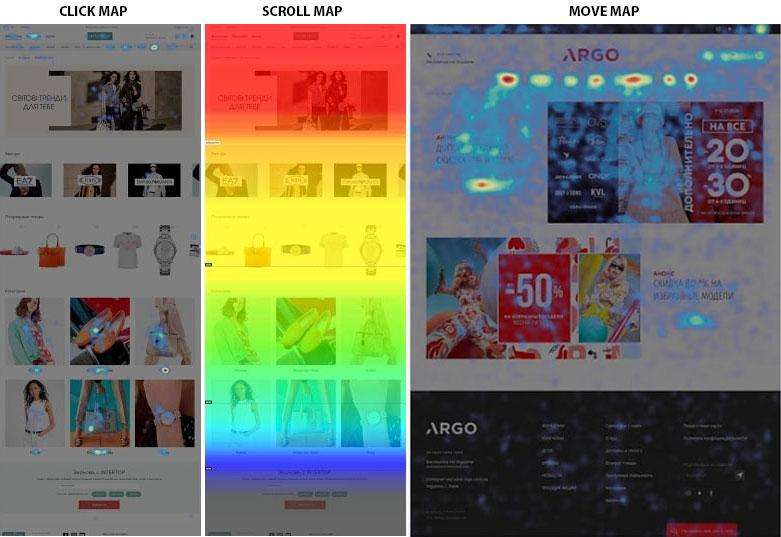
Hotjar is a behavior analytics and user feedback tool that helps retailers understand how customers interact with their websites.
Key features:
- Heatmaps: Provides visual representations of where customers click, scroll, and hover on retail websites, helping identify areas of high engagement and potential usability issues.
- Session Recordings: Records individual user sessions to give retailers a detailed view of how customers navigate their site, revealing pain points and opportunities for improvement.
- Feedback Widgets: Enables retailers to collect real-time customer feedback directly from the website, helping to understand user needs and preferences for more targeted improvements.
- Conversion Funnel Analysis: Tracks customer behavior through critical steps in the sales process, identifying drop-off points and areas to optimize for higher conversions.
- Survey Tools: Allows retailers to gather insights on customer satisfaction, preferences, and barriers to purchasing, enabling data-driven enhancements to product and website offerings.
13. Retail Next
Best for: Combining data from in-store sensors, cameras, and transactional systems to optimize customer experience and business operations.
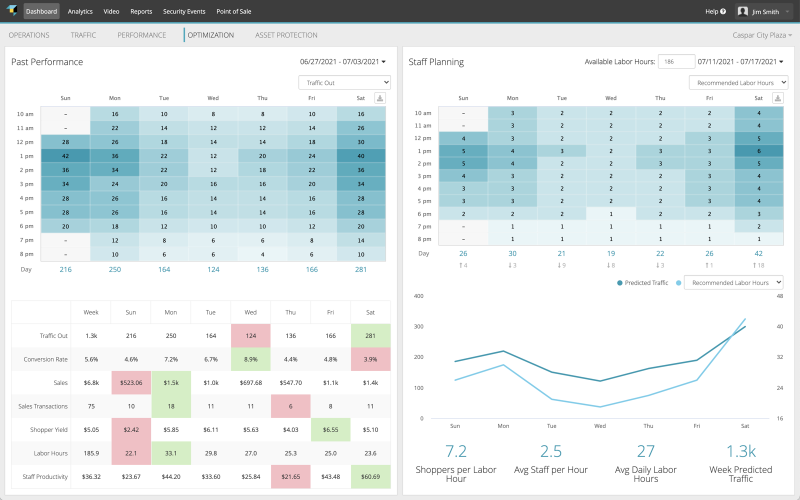
Retail Next is an advanced retail analytics software designed specifically for physical stores, offering deep insights into in-store customer behavior and operational performance.
Key features:
- In-Store Traffic Analytics: Tracks foot traffic and dwell times to identify peak shopping hours, customer flow patterns, and high-engagement zones, helping retailers optimize store layouts and staffing.
- Sales Attribution: Retail Next links in-store traffic and engagement metrics to sales data, providing insights into conversion rates and the effectiveness of promotional strategies.
- Heatmaps and Zone Analysis: Visualizes customer activity within the store to understand which areas are most visited and which products draw the most attention, enabling data-driven merchandising decisions.
- Real-Time Performance Monitoring: Retail Next provides live data on store activity, enabling immediate adjustments to inventory, staff allocation, or marketing campaigns to improve in-store efficiency.
- Integrated Analytics Dashboards: Combines data from multiple locations into a unified dashboard for chain-wide performance tracking, making it easier to identify trends and areas for improvement.
14. Power BI
Best for: Improving performance and customer satisfaction across operations through retail intelligence software.
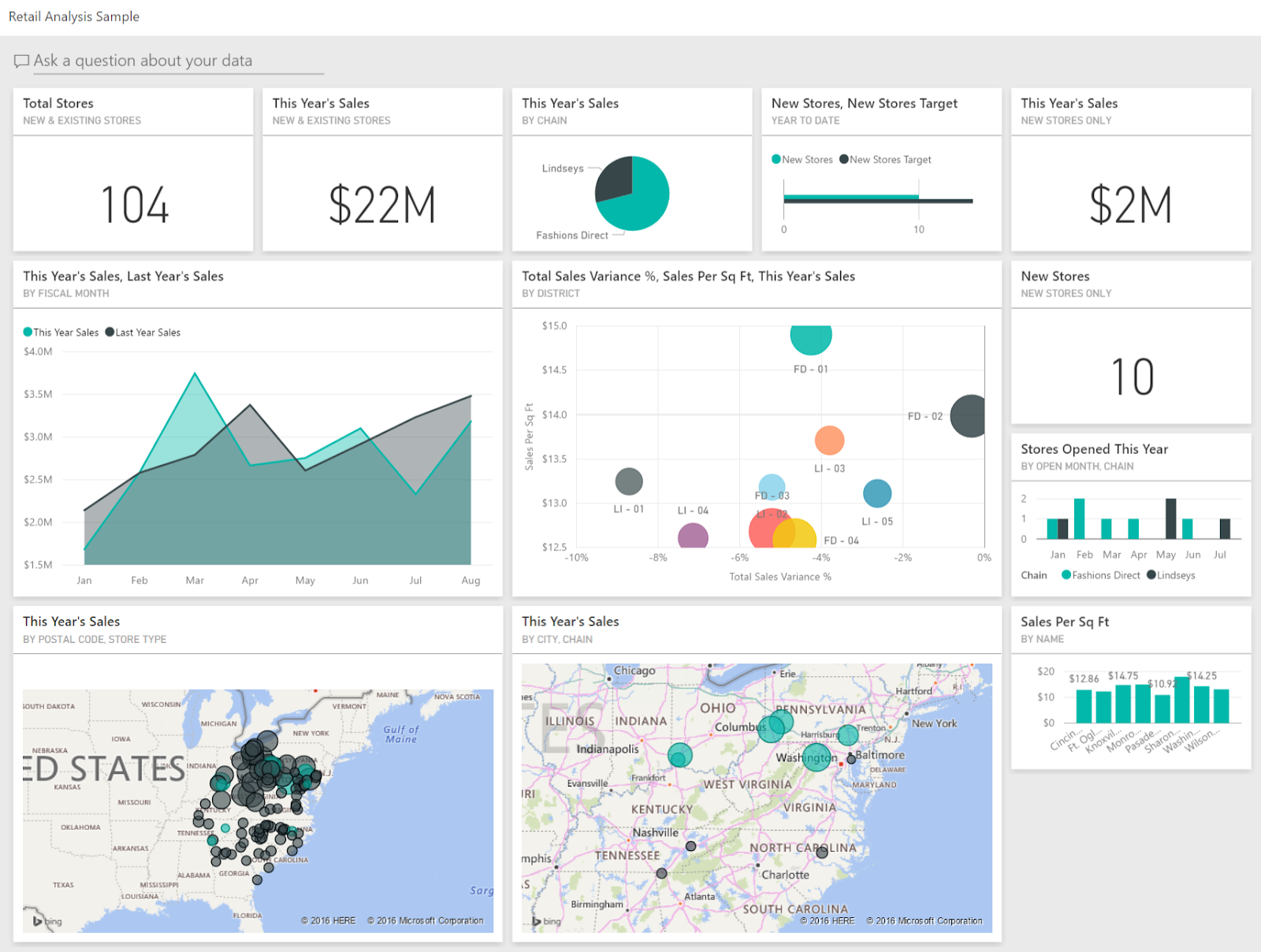
Power BI is a robust business intelligence tool that helps retailers consolidate, visualize, and analyze data from multiple sources.
Key features:
- Customizable Dashboards: Allows retailers to create interactive dashboards that provide a comprehensive view of sales performance, inventory levels, and customer metrics in one place.
- Data Integration: Seamlessly integrates with various retail tools, including POS systems, retail data solutions, and CRM tools, ensuring a unified analysis of all retail operations.
- Predictive Analytics: Uses advanced analytics to forecast demand, sales trends, and customer behaviors, helping retailers plan more effectively and optimize resources.
- Sales and Revenue Tracking: Provides insights into sales by region, product category, and customer segments, enabling data-driven decisions to improve profitability and customer engagement.
- Real-Time Reporting: Delivers up-to-date metrics, allowing retailers to quickly identify and respond to changes in sales trends, customer preferences, or operational inefficiencies.
- Cross-Channel Analysis: Combines data from online and offline channels, offering a holistic view of customer interactions and campaign performance.
15. Optimizely
Best for: Continually testing, analyzing, and optimizing customer digital experiences.
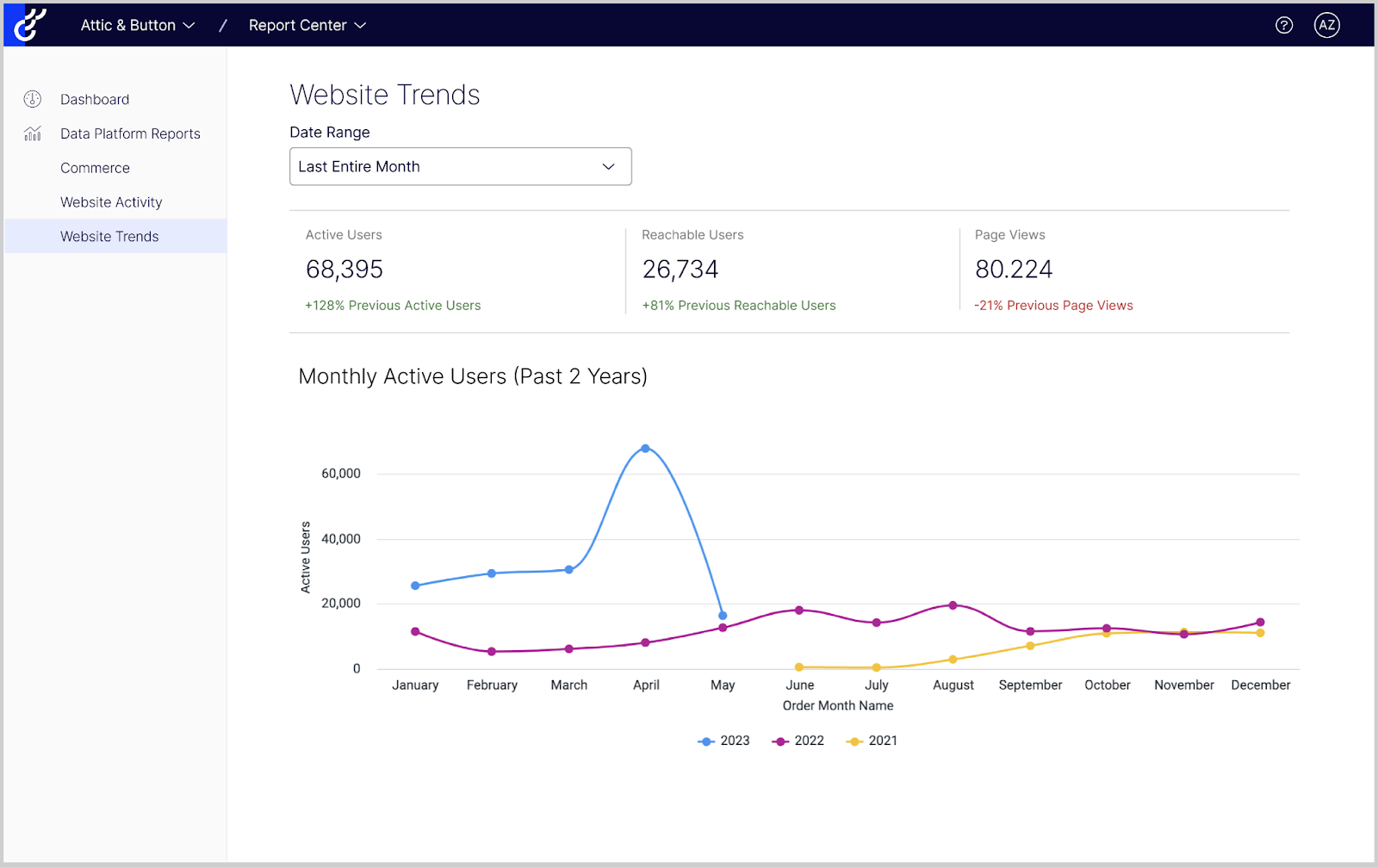
Optimizely is an advanced experimentation and personalization platform that enables retailers to test, optimize, and refine customer experiences across digital channels.
Key features:
- A/B and Multivariate Testing: Allows retailers to test different variations of website elements, such as product pages or checkout flows, to identify the most effective designs and layouts for driving conversions.
- Personalization Tools: Utilizes customer behavior data to deliver tailored experiences, such as personalized product recommendations and dynamic content, increasing customer engagement and retention.
- Behavioral Analytics: Tracks how customers interact with digital platforms, providing insights into shopping patterns, drop-off points, and areas needing optimization.
- Campaign Performance Monitoring: Measures the effectiveness of marketing campaigns by analyzing customer response rates, helping retailers refine strategies to maximize ROI.
- Integration with Retail Ecosystems: Seamlessly connects with ecommerce platforms, CRMs, and analytics tools to provide a unified view of customer behavior and performance metrics.
Ultimate Retail Analytics Software Stack
Retailers today require a comprehensive analytics stack to navigate the complexities of online and offline data, customer behavior, and campaign performance. Here are some of the key retail analytics companies and common use cases they address:
- Tools like Google Analytics 4, Mixpanel, and Hotjar provide in-depth insights into customer interactions.
- While platforms like Optimizely and Adobe Analytics support optimization and cross-channel tracking.
- For robust reporting and advanced visualization, solutions like Power BI and Tableau stand out.
- To unify data from multiple platforms and ensure accuracy, Improvado offers seamless integration with 500+ data sources, making it an indispensable part of a modern retail analytics stack.
Combining these tools allows retailers to gain actionable insights, improve operational efficiency, and drive measurable growth.
.png)



.png)
